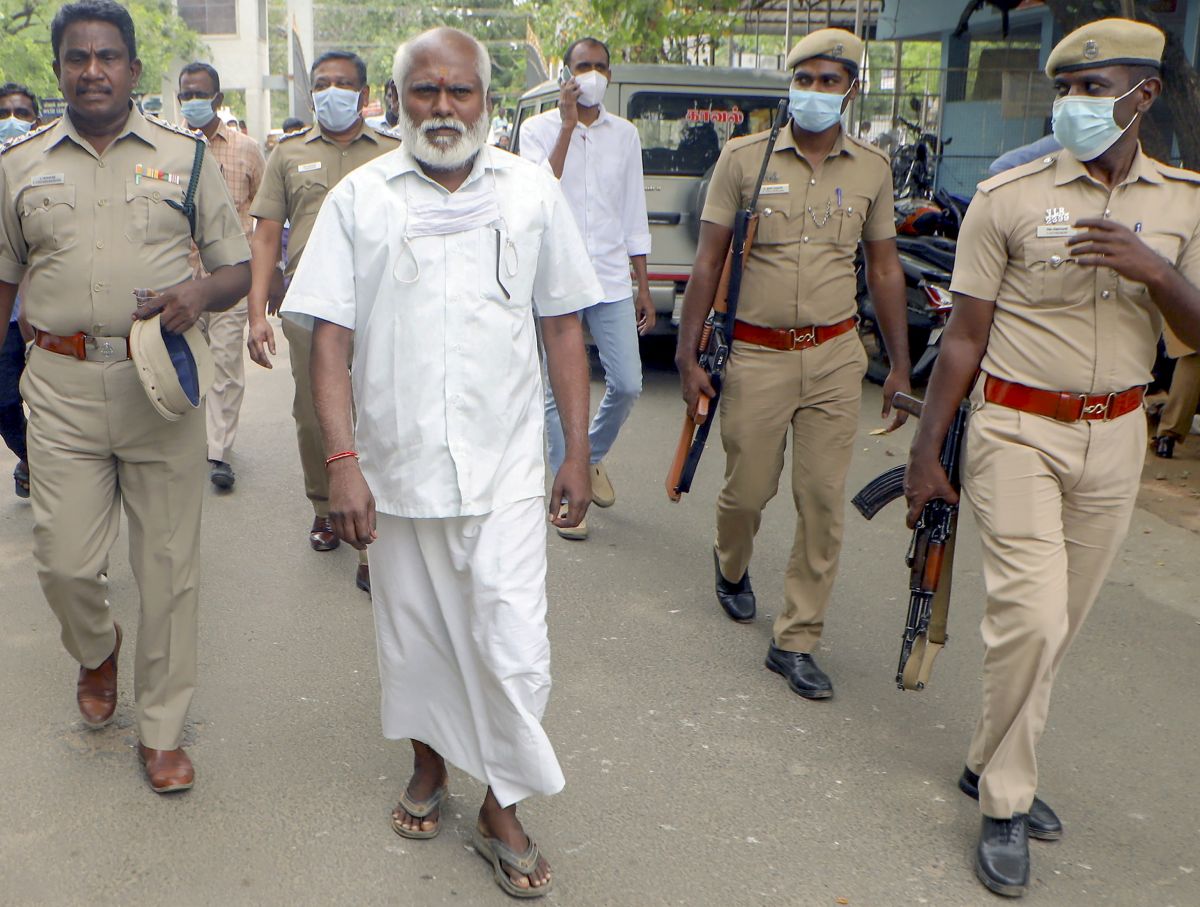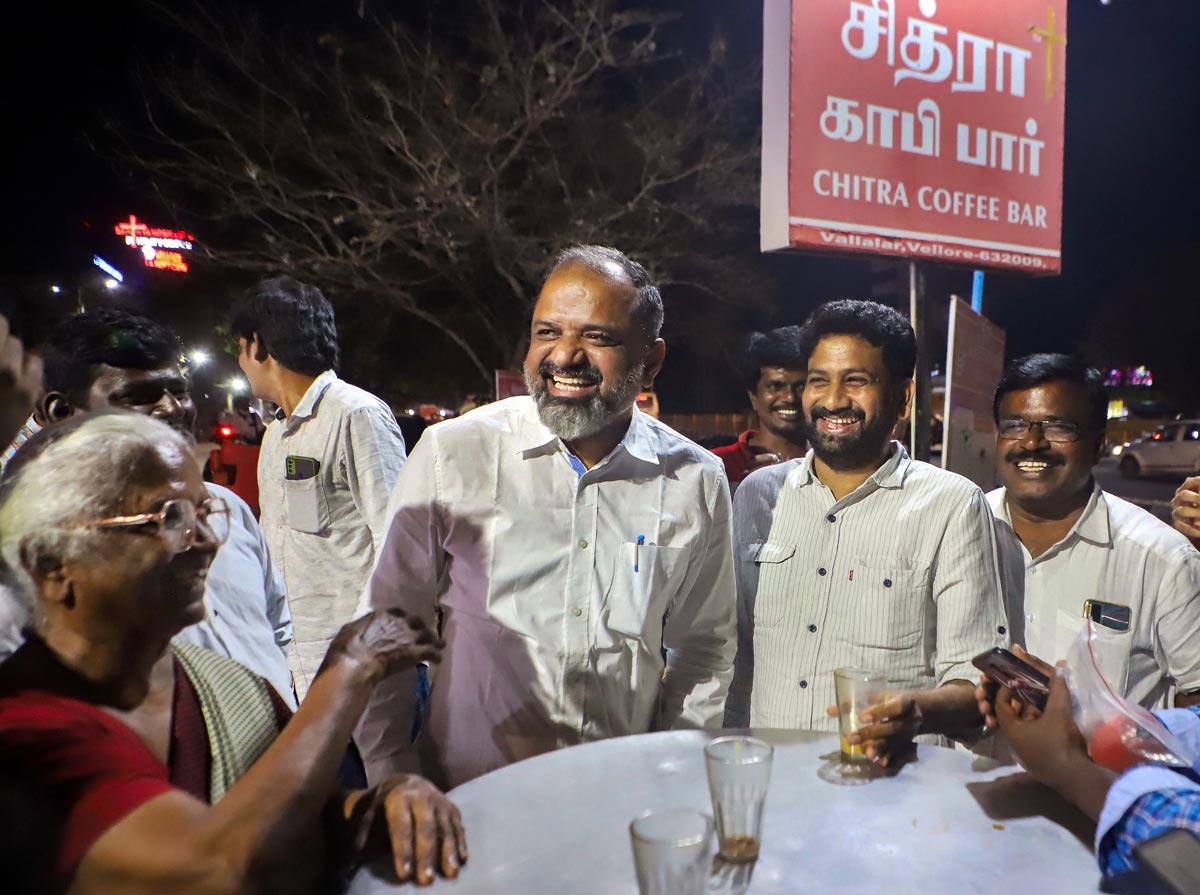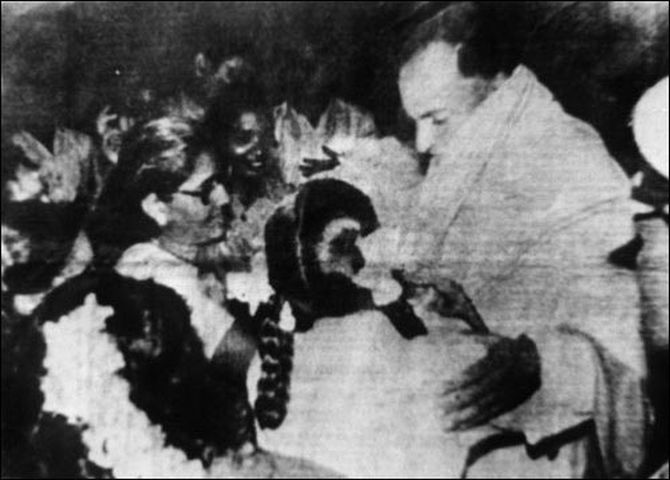 | « Back to article | Print this article |
The current question is about the BJP-ruled Centre, headed by Prime Minister Narendra Modi, like its predecessors, not arguing the Union of India's case effectively and continuously, whenever the matter came up in the past, if its case still was that Rajiv's killing was an 'act of terror', asks N Sathiya Moorthy.

As was to be anticipated, the Centre has moved the Supreme Court with a review petition against a division bench order granting freedom for six convicts in the assassination case of former prime minister Rajiv Gandhi, whom opinion polls had predicted would return to power after the parliamentary polls in 1991.
Possibly, no one expected the Centre to act with such alacrity, which it did not obviously show through the months and years when this and related petitions seeking remission and freedom for the Rajiv killers were being heard by the Supreme Court and by the Madras high court earlier.
In a way, the final acquittal for all Rajiv Gandhi murder case convicts without any of them having to pay for it with his or her life or serve out the original life-term was pregnant and repugnant possibilities for the future.
It gave the impression that as long as you have a lot of patience, a la Robert Bruce or and the consistency of a Mahmud of Ghazni, political campaigners on your side, and some luck, you can escape the hangman's noose and even prison term after being convicted in the assassination case of a national leader in India.
In referring to this aspect, the Centre's review petition, has seemingly separated the two Indians, namely, Nalini and Ravichandaran, both Indian nationals, and the four Sri Lankans, Jayakumar, Suthenthiraraja alias Santhan, Murugan and Robert Payas.
The petition rightly points out, 'Granting remission to terrorists of a foreign nation, who had been duly convicted in accordance with the law of the land for the gruesome offence of assassinating a former prime minister of the country, was a matter which had international ramifications and therefore fell squarely within the sovereign powers of the Union of India.'
In plain terms, it tantamount to a bunch of ex-terrorists thumbing their nose at the Indian State, its systems and institutions.

If the Supreme Court admits the Centre's review petition for hearing, then, the defence can be expected to claim they were not 'terrorists', Indian or foreign.
They would argue how a Supreme Court Bench under Justice K T Thomas -- honoured with a Padma Bhushan years later for his non-judicial 'social service' -- had long ago held that it was not an 'act of terror', though then and since, the LTTE-perpetrator has been declared a 'terrorist organisation' the world over.
At the time, the court also came up with the specious finding that the convicts had no motive to kill 14 others, including seven uniformed men of different ranks as they did, nor inflict grievous injuries on 40 more, again, including police personnel, as Rajiv Gandhi was their only target.
All this, the bench said without even the defence proffering any such argument, as all 26 accused had pleaded 'not guilty', through and through.
It looked as if the law of evidence applicable to the State (read: police) in criminal cases of the kind did not bind the bench.
Justice Thomas's verdict was not the only one on 'terrorism'.
In the 'Vaiko case', again involving Tamil Nadu but pertaining to the detention of the MDMK founder, the Supreme Court, in a standalone case, later held that positive/propagative speeches on the ideology and methodology of a banned 'terrorist organisation' did not constitute an act of terror. The ruling stands.
The unasked question just now is if the court's application of inherent powers under Article 142 of the Constitution for enforcing its own verdict to the case was judicious in a case of the kind or should the bench have referred at least this part of it to a larger, Constitution bench to lay down guidelines for the purpose.
Given that the state of Tamil Nadu under different governments had stood by the convicts, the Centre alone still had the concern and the locus standi to argue this or any other part of the case, through a review petition.

Technically, yes, neither the convicts, not even the Bench on its own, made the Union of India a respondent. However, the nation's media was full of the news both when the Madras high court first heard and dismissed the case, with the specific observation that it did not have inherent powers akin to Article 142 available only to the Supreme Court.
It was obvious that the convicts would then move the Supreme Court. It is anybody's guess why the Centre did not file a caveat in the Supreme Court that any petition on the matter should not be heard without notice, and without impleading it as a party.
The Centre did not file any caveat in the Supreme Court, once the HC had thrown up its hands in the matter.
It does not stop there.
Six months back, another bench of the Supreme Court had set free a seventh convict in the case, using Article 142. A G Perarivalan's case should have rung warning bells at Delhi, but it did not. Neither did the Centre file a review petition in his case, nor did it file a caveat either in the Supreme Court or the Madras high court.
Should the Centre seek to argue only the case of the four foreigners, then the question may arise if the nation's penal laws made such a distinction. It is not entirely unlikely if Perarivalan's name is added to the list, either by the Centre of the court, at a later stage.
Of course, the question also arises if Governor Ravindra Narayana Ravi, himself a veteran police officer with knowledge of criminal and penal laws, approached the Centre for advice and guidance, and if such advice was made available to him, when he continued to sit on the state cabinet's resolutions to set the convicts free.
Such communication is deemed confidential.
But the way the Supreme Court having to rule twice in a gap of six months -- first when ordering A G Perarivalan's premature release in May -- that the state governor had to act only on the 'advice of the council of ministers' in the matter, would show that there was either not adequate or timely application of mind, somewhere along the line.
Instead, it would have been better for the Chennai Raj Bhavan to have rejected the cabinet decision or seek the apex court for direction on the governor's powers in the matter.
If nothing else, by sitting on the state cabinet resolutions in the matter of freedom for the Rajiv convicts, Ravi and his predecessor Banwarilal Purohit might have unwittingly given time and space for public sentiment to be whipped up in the convicts' favour, that the Indian State was unkind and possibly unjust to them.

The current question is about the BJP-ruled Centre, headed by Prime Minister Narendra Modi, like its predecessors, not arguing the Union of India's case effectively and continuously, whenever the matter came up in the past, if its case still was that Rajiv's killing was an 'act of terror'.
It is anybody's guess how past governments had surrendered the Centre's rights and responsibilities, similarly letting the Tamil Nadu governor of the day to commute Nalini's death sentence into one of life-term, based on the state cabinet's recommendations, but in a case handled by the CBI under a central law.
Even in political terms, no one, then or since, has really asked how Sonia Gandhi came to condone Nalini's deed, whatever be her sentiment for the young mother that the latter was.
No one in Sonia's circle, whether political or personal, seemed to have suggested that Nalini chose to participate in the dastardly conspiracy when she was a young wife, and possibly knowing that she might have been pregnant with her first child.
Unfortunately, all criticism for 'facilitating' the freedom of Rajiv murder case convicts has been unilaterally apportioned to the Dravidian polity in Tamil Nadu, where successive state governments have argued their case, even if not directly in the Supreme Court.
No one, including editorial writers and columnists who are critical of the final outcome and the road leading up to it, has asked why successive governments at the Centre readily surrendered their duty and responsibility under the Constitution to the state government, and then cried 'wolf' after allowing them to bolt.
Now, it would look as if, not only the DMK and AIADMK, the PMK and MDMK, the VCK and NTK, all claiming to represent 'pan-Tamil interests', were actually 'facilitating' freedom for Rajiv murder case convicts.
While in power, even national parties like Rajiv Gandhi's own Congress party and bete noire BJP, which has all along made a big issue of 'cross-border terrorism' from across the land borders up north, let this one, from across the southern waters, go unpunished.
As mere coincidence would have it, the court-ordered freedom for the convicts came only days after the Union home minister asked the nation and its security agencies/forces to be vigilant about Islamic terrorism, Naxalism and such other violent acts challenging the sovereignty and territorial integrity of the Indian State.
Yet, the Centre did not intervene in the pending case as effectively as it should have at any time through the eight years of the Modi government, either.
It was more than a coincidence that the NIA, which has taken over the terror-related work of the CBI some years ago, had busted other LTTE module-like operations in recent months.
Among them are cases where ex-cadres bent on reviving the banned LTTE had taken to drug smuggling in a big way -- the way Sri Lankan Tamil militant youth groups had funded their operations in the very early days, in the seventies and early eighties.
Maybe, the Centre now filing a review petition in the Rajiv convicts' case lest wrong precedents should be set in the nation's fight against terrorism -- to end which the Modi government launched a surgical strike into PoK, circa 2016 -- would go some way, after all!
N Sathiya Moorthy, veteran journalist and author, is a Chennai-based policy analyst and commentator.
Feature Presentation: Aslam Hunani/Rediff.com